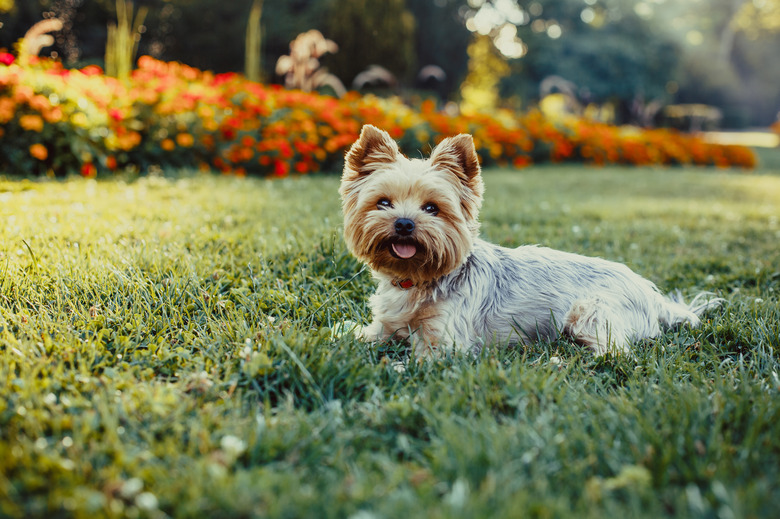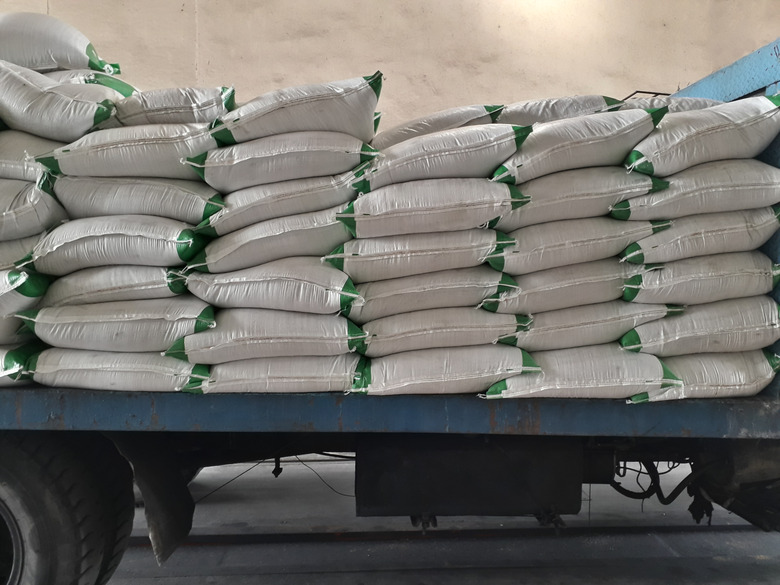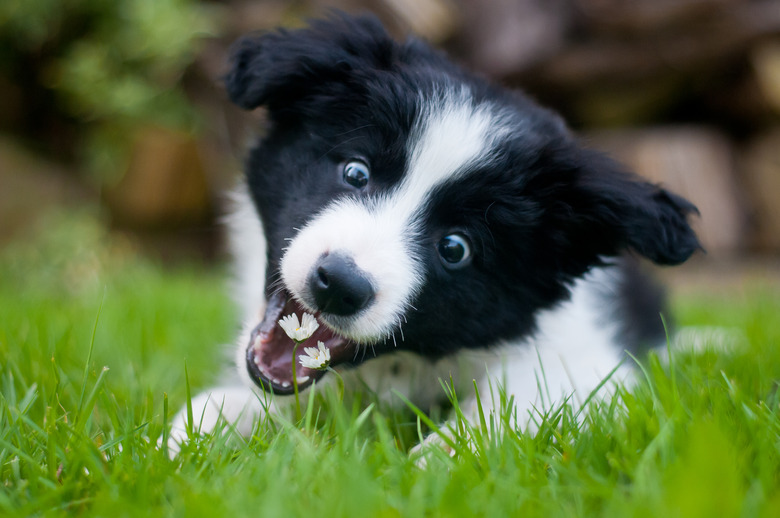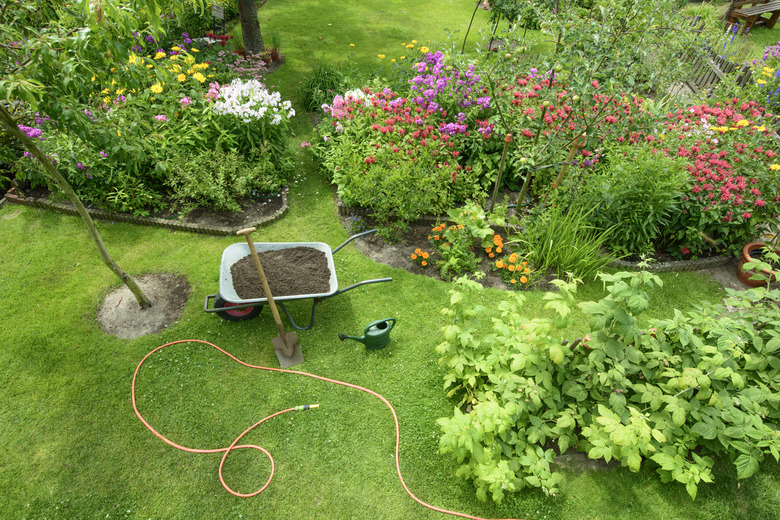What To Do If Your Dog Eats Fertilizer
Inspired by his unending joy for life, you marvel at how your dog manages to turn even a simple walk in the park into an adventure. His indomitable spirit and entertaining antics keep you smiling. For that, and so much more, you love him dearly and do everything in your power to keep him safe from harm.
It's a tall order when you consider all the things that can potentially be dangerous to your dog's health. And sometimes, of course, a dog is his own worst enemy, and being a pet parent means your dog is wholly dependent upon you to keep him out of trouble. For example, he can't use his own judgment on whether something should or should not be chewed on or devoured, and sometimes dogs just dig in; it's the nature of the beast.
Unfortunately, noxious items such as dirt, rocks, socks, human medication, sticks, chocolate, houseplants, rodenticides, and many more inedible and toxic items; among them, lawn fertilizer, can end up in his tummy. Consequently, proper storage and making noxious items inaccessible to him goes a long way in the prevention of accidental poisoning, gastric upset, or obstructions that may require surgery. In the case of fertilizer, keep in mind that close supervision of your dog when outdoors is also vitally important.
Because even if you do everything right and keep fertilizer safely locked up, your dog may encounter lawn fertilizer on a neighbor's property, or even in a public space. Many dogs like to eat grass, and if he nibbles on fertilizer-treated grass, he will be exposed to the fertilizer's toxins. In this case, you'll need to act fast and know what to do.
First, call your veterinarian, the Pet Poison Helpline at (855)764-7661, or the National Animal Poison Control Center at (888)426-4435 for professional advice.
Dogs and indiscriminate eating
Dogs and indiscriminate eating
Partly due to their inquisitive nature and willingness to investigate everything with their mouths, dogs far outrank other species when it comes to owners seeking aid for potential poisonings through the Pet Poison Helpline, making up 70 to 80% of all animal cases. Known as indiscriminate eating, or pica, many inedible items your dog eats like dirt or non-toxic organic matter may safely pass through her system, but pica is downright dangerous when it comes to ingesting toxic substances like lawn fertilizer, directly out of the package or in fertilizer-treated landscapes.
Proper storage and preventing exposure
Proper storage and preventing exposure
Pet Poison Helpline advises pet parents to poison-proof their home. To that end, properly storing lawn fertilizer in your home or garage by making it completely inaccessible to your dog will help prevent accidental poisoning. If you use lawn fertilizer on your property, secure that portion of the lawn with a barrier such as a fence to keep your dog out and safe from potential poisoning.
What to do if your dog eats toxic fertilizer
What to do if your dog eats toxic fertilizer
Lawn fertilizer is a mixed bag of plant nutrients, including varying amounts of nitrogen, phosphorous, and potassium also known as potash; the amounts of each are expressed in a ratio, for example, 30-10-10. Along with the main ingredients may be iron, copper, zinc, cobalt, boron, manganese, and molybdenum, some of which may be toxic in large concentrations. And it's not unusual for fungicides, pesticides, and herbicides to be present in fertilizer formulations.
A small amount of fertilizer consumed may cause only mild stomach upset, while the larger the quantity consumed, the more serious the effects and severe poisoning can occur.
If you think your dog ate fertilizer, call your veterinarian, an emergency veterinary hospital, the Pet Poison Helpline at (855)764-7661, or the National Animal Poison Control Center at (888)426-4435 for professional advice. If possible, when you call for help, it's important to have the label from the fertilizer package at hand; the product name and the ingredients list.
Closely observe your dog's behavior and body posture, and watch for the following clinical signs of poisoning; keep notes on your observations to assist your vet in diagnosis and treatment:
- Drooling
- Nausea
- Acute or delayed onset vomiting.
- Diarrhea
- Abdominal pain indicated by an abnormal posture.
- Difficulty breathing.
- "Muddy" colored gums.
What to do if your dog eats non-toxic fertilizer
What to do if your dog eats non-toxic fertilizer
Avoiding toxic lawn fertilizers altogether by purchasing pet-friendly, non-toxic organic fertilizers is a better choice for pet parents than traditional toxic formulations, but you should be aware that organic products such as bone meal, can be potentially harmful to your dog if ingested in a large enough quantity, and depending on the size and age of your dog.
Organic fertilizers can contain blood meal and feather meal along with bone meal. These palatable organics encourage dogs to eat large amounts if given the opportunity. Pet Poison Helpline explains that bone meal forms clumps in the stomach that a dog cannot digest. This stone formation of foreign matter is known by vets as a bezoar, and it creates a bowel obstruction that could potentially require surgical removal. Bezoars may also cause severe and painful pancreatitis in some dogs, particularly breeds prone to it, such as miniature schnauzers or dogs with a previous history of pancreatitis.
Ingestion of organic, non-toxic fertilizer may also cause mild to severe gastrointestinal upset accompanied by vomiting, diarrhea, or bloody diarrhea, all of which could become serious or even potentially life-threatening.
If your dog has eaten organic fertilizer, Pet Poison Helpline advises that you should induce vomiting as soon as possible to get the bone meal out of his system before it forms a stone, which can occur in as little as 48 hours. For instructions on emesis (inducing vomiting) and what to do next, consult your vet, an emergency clinic, or the Pet Poison Helpline.
Conclusion
Conclusion
Lawn fertilizer should be properly stored in an area inaccessible to your dog and other pets. If encountered in the environment and ingested by your dog, act fast and call your vet, an emergency vet hospital, or one of the two pet poison helplines, which are available 24/7; have the product name and ingredient list handy, if possible.
If it's an organic, non-toxic fertilizer that your dog ingested such as one that is bone meal-based, keep in mind organic fertilizer is extremely palatable to carnivores and your dog will tend to eat a large amount if given the chance. Be aware it can form a bezoar or obstruction in the stomach necessitating surgical removal, and you will need to induce vomiting to eliminate that outcome, either on your own or if you can obtain veterinary assistance right away.
Therefore, no matter what kind of lawn fertilizer you use, be it old school or "pet-friendly," keep it safely out of reach of your dog. And to prevent toxic exposure to fertilizer in the environment, keep your dog under close supervision, don't let her roam onto lawns, and watch for signs posted in parks and other public areas, and even private homes indicating a lawn has been treated with fertilizer, which is a mandatory requirement for landscaping companies.
Always check with your veterinarian before changing your pet's diet, medication, or physical activity routines. This information is not a substitute for a vet's opinion.



